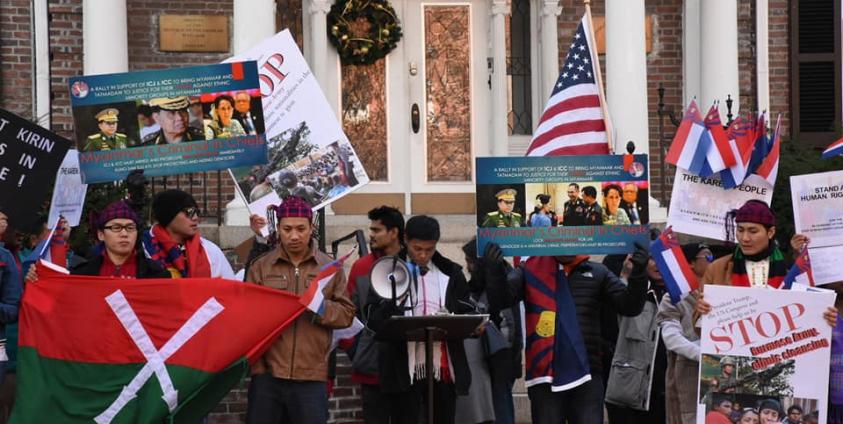The International Court of Justice began its hearing on December 10 in The Hague, Netherlands on its genocide lawsuit filed by Gambia against Burma government.
Prior to the court hearing, several ethnic Karen, Karenni and Shan civil society groups put out a joint statement supporting Gambia’s lawsuit.
On December 2, 2019 the Worldwide Karen Community issued a statement welcoming the filing of the genocide case against Burma at the ICJ and the decision by the International Criminal Court (ICC) to proceed with an investigation into the crime of deportation against the Rohingya.
The statement endorsed by 48 Karen civil society organizations around the world said that as the Rohingya case, Karen people suffered for decades from systematic human rights violations by the Burma Army.
The Worldwide Karen Community statement said; “this is a critical time for action. It is urgently needed for the international community to exert further pressure, including economic sanctions, to push for a complete halt to Burma Army offensives throughout the country – and to start a genuine, inclusive dialogue. Only a new federal constitution, granting the ethnic people their right to autonomy, and bringing the Burma Army under civilian control, can bring an end to the civil war and the ongoing crimes by the Burma Army.”
On December 8, the Karen Grassroots Women Network put out a statement supporting the ICJ lawsuit saying that for decades, women have experienced and witnessed the abuse of ethnic people in Burma taking place with impunity.
The statement said; “we have tirelessly called for accountability to uphold the rule of law through the prosecution of perpetrators. Women’s groups have been documenting sexual violence in conflict and have lobbied for stronger rule of law mechanisms for many years.”
The KGWN said it was pleased the international community was taking notice of the calls by ethnic groups for human rights abuses to be investigated and were “in solidarity with efforts and calls made for justice. We hope for the day when we will have a country subject to the rule of law, but until that day we depend on these international actions to help bring justice to victims and an end to ongoing crimes.”
On December 9, the International Karen Organization (IKO) issued an statement demanding the Burma government and the military face legal action at the ICJ for crimes against humanity.
The IKO statement called on the Burma delegation to face the the ICJ and “to disclose with courage the incidents that have taken place in the field objectively, conscientiously and responsibly, in recognition of the basic principles and standards of the Universal Human Rights.”
The Karenni Civil Society Network (KCSN) on December 9, along with more than 10 civil society member groups in a statement supported the ICJ lawsuit. It highlighted the Burma military’s widespread human right violations against ethnic people and for international to pressure to make the Burma Army stop its operations against civilian populations.
Joining with other ethnic groups, 17 Shan civil society organizations said in a statement its communities supported the international legal cases being brought against Burma’s military leaders, who authorized atrocities against the country’s ethnic peoples’ for decades with impunity.
The Shan statement said; “The people of Shan State have suffered a similar pattern of systematic atrocities to the Rohingya for decades, particularly during the Burma’s Army’s scorched earth campaign of 1996-1998, when over 300,000 people in 1,400 villages in central and southern Shan State were forced at gunpoint from their homes – most fled to Thailand, and are unable to return till today. Hundreds of villagers were massacred, and many tortured, including Buddhist monks.”
The Shan statement said “rape was also clearly used as a weapon of war. The 2002 report -License to Rape: The Burmese military regime’s use of sexual violence in the ongoing war in Shan State – documented cases of sexual violence by the Burma Army against 625 women and girls during 1996-2001.”
While the ethnic civil society groups statements supported the ICJ and ICC cases, many people in Burma urban areas rallied to show their support for Aung San Suu Kyi’s defense of the lawsuit at ICJ.








